Guaranteed to teach you things you never knew.
Storyworth® vs My Life in a Book vs Remento
Compare Storyworth, My Life in a Book, and Remento to discover which platform best fits your needs—whether you’re looking to write your own life story or prefer a collaborative, recording-based approach that transforms memories into a keepsake book without the need for writing.
In recent years, more families have started turning their attention to preserving their loved ones’ stories. Whether it’s capturing a grandparent’s childhood memories or documenting a parent’s life lessons, storytelling platforms make it easier than ever to save those precious narratives for future generations.
Three of the most popular options today — Storyworth®, My Life in a Book, and Remento — take very different approaches to the same goal.
Here’s the short version:
- Storyworth and My Life in a Book are best for those who want to create a memoir.
- Remento is ideal for families who want a life story book that combines written stories with recordings of their storyteller recounting each one.
Below, we break down how each platform works, who it’s best for, and what makes them different.
Storyworth: The Weekly Question Approach
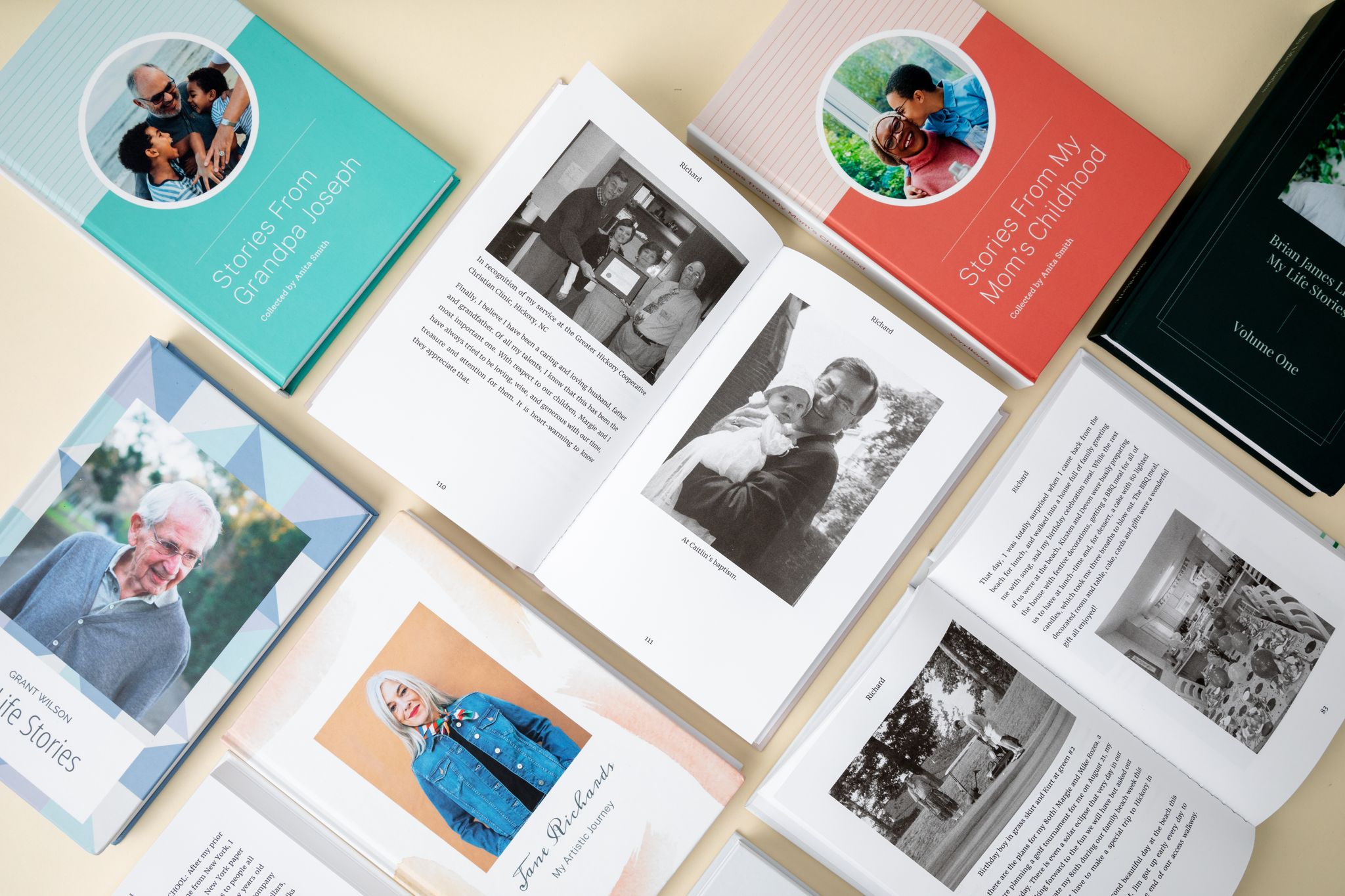
After signing up, Storyworth sends one question each week to the chosen storyteller by email. The recipient can reply by typing their answer, attaching photos, or using Storyworth’s dictation feature to speak their response.
The recordings are automatically transcribed into text, but the audio itself isn’t saved or included in the final book.
Over the course of a year, those written responses are collected and compiled into a hardcover keepsake book that families can print and share.
How are stories shared with Storyworth?
As the storyteller replies to each question, their responses are stored privately in their online account. Family members can be invited to view stories via email, but sharing depends on the storyteller sending or granting access manually.
Who is Storyworth right for?
Storyworth is a great fit for people who enjoy writing and want to reflect on their memories through text. The weekly prompts provide structure for those who like crafting thoughtful written responses and building a book over time. It can also work well for storytellers who prefer speaking to typing, as the dictation feature transcribes spoken words into text. However, because the audio isn’t saved and the transcription reflects exactly what’s said, it’s best suited for people who speak in clear, well-organized sentences and want their words printed as-is.
Storyworth Pros
- Preferred by writers: Ideal for those who enjoy reflective writing or prefer full control over their words.
- Structured and reliable: Weekly prompts over 52 weeks provide a consistent storytelling cadence.
- Produces a polished book: Creates a hardcover, keepsake book with clean design and consistent formatting.
Storyworth Cons
- No voice preservation: Recordings of the storyteller are not accessible through the book.
- Verbatim transcription only: Dictated stories appear exactly as spoken, often without punctuation or cleanup, making them feel raw or fragmented - not ideal for less-structured speakers.
- Can’t record the stories behind photos: Photos can be added to existing stories, but they cannot be used to inspire the sharing of memories associated with the image itself.
- Smaller (and more expensive) books - Printing additional copies of Storyworth’s 6”x9” color-printed books costs $79 each.
- Minimal collaboration: Family can suggest prompts and edit stories, but cannot add comments to ensure the storyteller feels heard and valued.
My Life in a Book: The Comprehensive Questionnaire
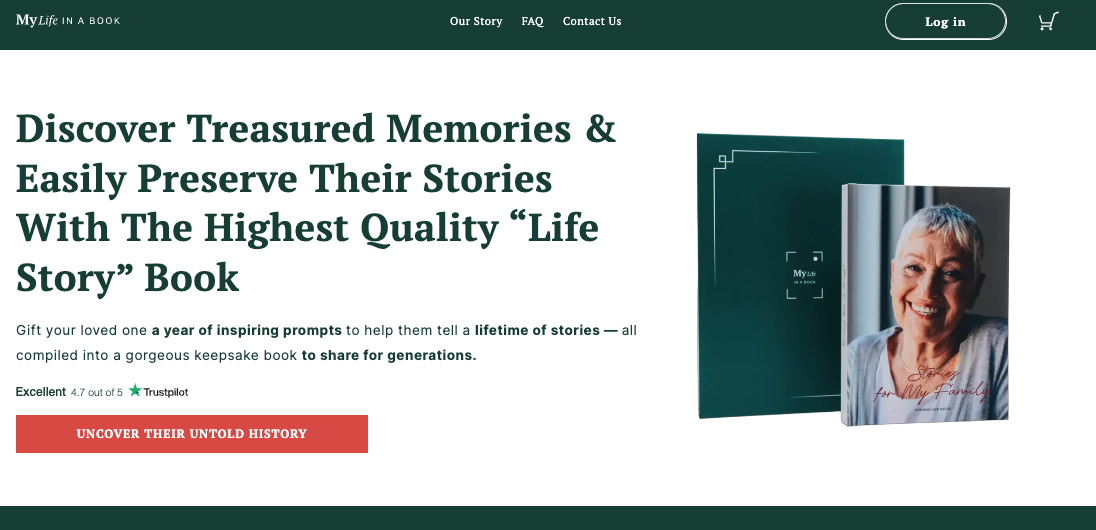
My Life in a Book takes a more comprehensive approach than Storyworth’s weekly question format. Instead of sending prompts over a year, it provides a large questionnaire covering multiple areas of life all at once. Users can answer these questions at their own pace, rather than on a schedule.
While Storyworth builds engagement gradually, My Life in a Book focuses on creating a complete autobiography through a single, detailed process.
How are stories shared with My Life In A Book?
Similar to Storyworth, storytellers of My Life In A Book are able to write stories using the company's digital platform.
Who is My Life In A Book right for?
My Life in a Book is ideal for individuals who prefer a more comprehensive, one-time approach to documenting their life story. It's well-suited for those who enjoy writing and have the time to dedicate to a detailed questionnaire.
Overall My Life In A Book Pros:
- Comprehensive life story: The extensive questionnaire ensures a thorough coverage of one's entire life, resulting in a complete autobiography rather than disconnected anecdotes.
- Self-paced process: Working through the questionnaire at one's own speed allows for thoughtful reflection without the pressure of weekly deadlines.
- Cohesive narrative: The final product is a chronological, well-structured life story, providing a clear timeline of events and experiences.
Overall My Life In A Book Cons:
- Overwhelming task: The comprehensive questionnaire can feel daunting, potentially discouraging some users from completing their life story.
- Limited family involvement: The focus on a single author's perspective may exclude the interactive element of family storytelling and shared memories.
- Lack of ongoing engagement: Without regular prompts or sharing options, the process might feel isolated and disconnected from day-to-day family interactions.
The Voice-Powered Memory Book
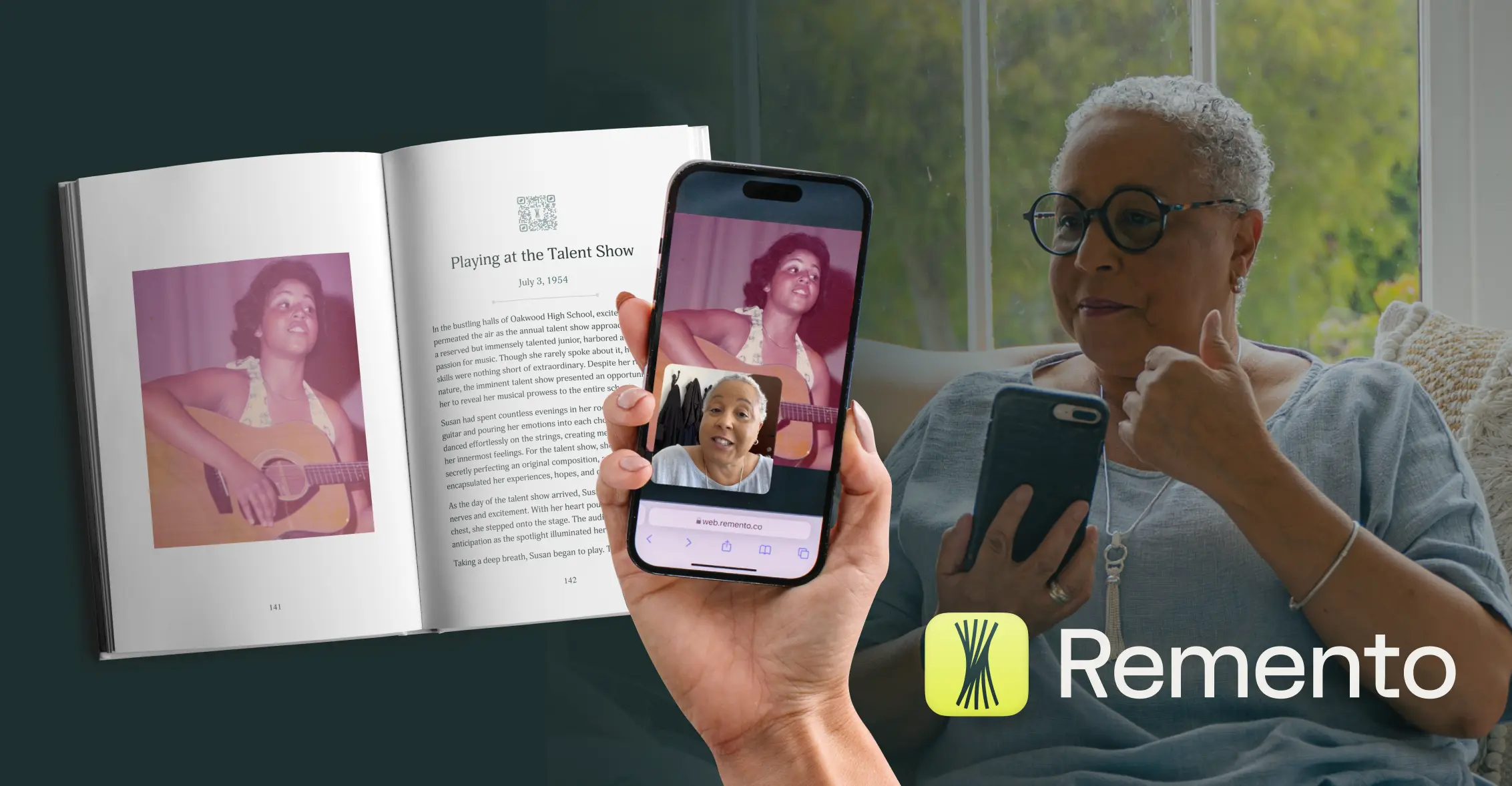
Remento helps families turn spoken memories into beautifully written, voice-preserving stories without requiring a single word to be typed. Each week, storytellers receive a new prompt via text or email, often linked to a photo or a custom question chosen by family members.
How are stories shared with Remento?
Each week, storytellers receive their prompt and record a short reflection right from their inbox or phone. Prompts can be customized by family members and can include both photos and text.
.png)
They simply record their response using any smartphone, tablet, or computer — no downloads, logins, or passwords needed.
Those recordings are then transformed into polished written stories through Remento’s Speech-to-Story technology. Families can choose between three formats:
- Clean transcript: Lightly edited, preserving the storyteller’s natural rhythm.
- First-person narrative: Written as if the storyteller authored it.
- Third-person biographical story: Presented as a narrative told about the storyteller.

Once recorded, Remento’s system refines the story and shares it automatically with the family. Everyone can read the written story, react to it, and later enjoy a hardcover book that combines text, images, and scannable audio links.
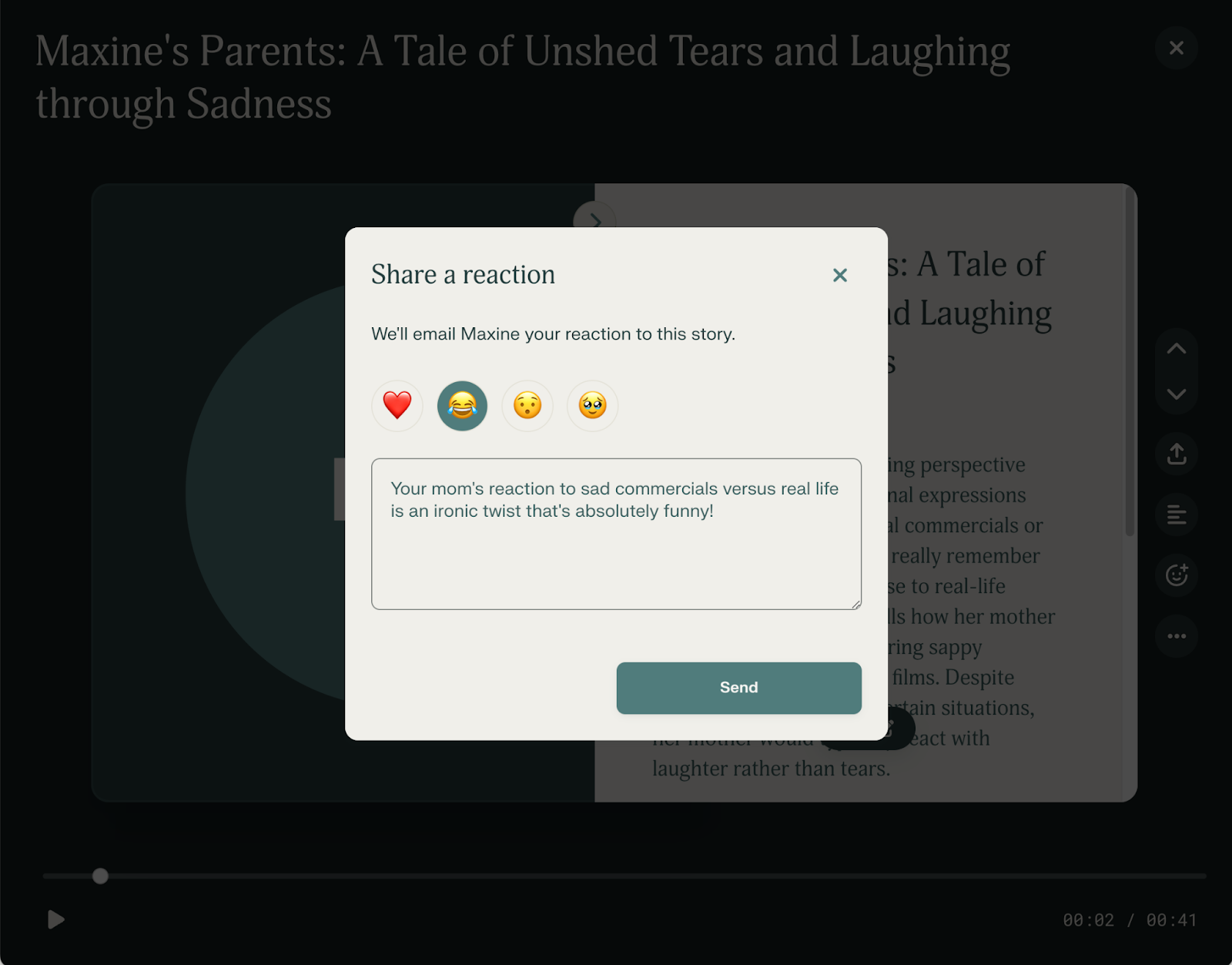
Each story is printed in a full-color hardcover book (8x10 inches) with QR codes that link to the original recordings, allowing families to both read and listen to their loved one’s stories.
Who Remento Is Right For?
Remento is perfect for anyone who prefers speaking over writing, particularly parents or grandparents who want their voice, tone, and warmth preserved for future generations.
Remento Pros
- Preserves both story and voice: Unlike traditional memoir tools, Remento captures a storyteller’s authentic voice alongside their written narrative through QR-linked recordings, making the experience emotional and deeply personal.
- No editing required: Remento’s Speech-to-Story™ technology turns recordings into either “cleaned transcripts” or more narrative-style (fully editable) stories, designed to feel like a professional writer had been hired to document the memories while retaining the storyteller’s tone and personality.
- Effortless for older adults: No writing, typing, or logins required. Storytellers simply speak their memories, making it accessible even for those who find technology intimidating.
- Creates a multi-sensory keepsake: The 8” x 10” hardcover book blends text, audio, and photos into a vivid family heirloom that can be read, heard, and shared.
- Encourages meaningful family connection: Weekly prompts and collaborative tools invite children and grandchildren to participate, turning memory capture into an ongoing family ritual.
- Discover the stories behind photos: Use photos to spark memories by adding them to prompts, or adding them after a recording to bring the story to life.
Remento Cons
- Not ideal for writers: Remento was designed for people who prefer the ease of speaking their stories over the chore of writing them.
- Voice recording comfort required: Storytellers must be comfortable speaking aloud and recording themselves (although they can do so from any device and without any downloads, logins, or passwords)
Learn more: Remento
BONUS: Hear what customers are saying
What Customers Say About Storyworth
Many reviewers praise Storyworth for its thoughtful questions and high-quality books, though some note that keeping up with the weekly prompts can be challenging.
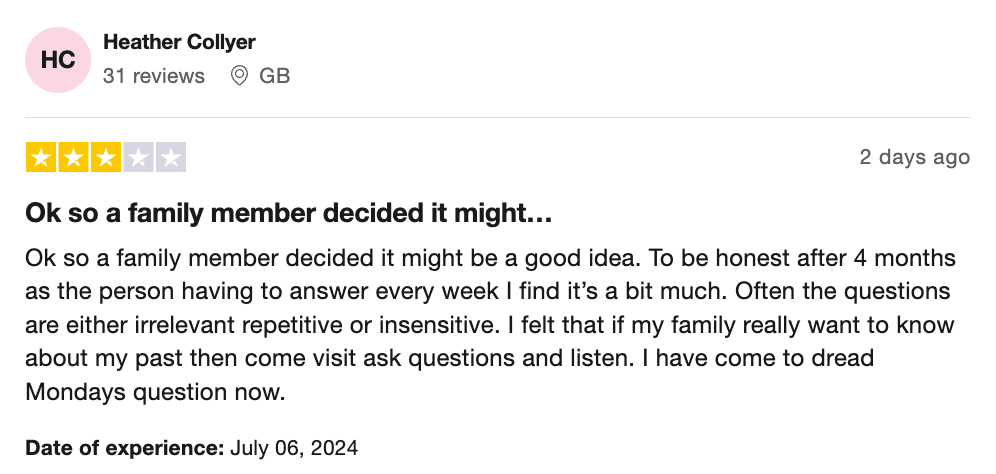
What Customers Say About My Life in a Book
Users appreciate the depth and completeness of the questionnaire, though several mention that the format can feel overwhelming without regular motivation or collaboration.
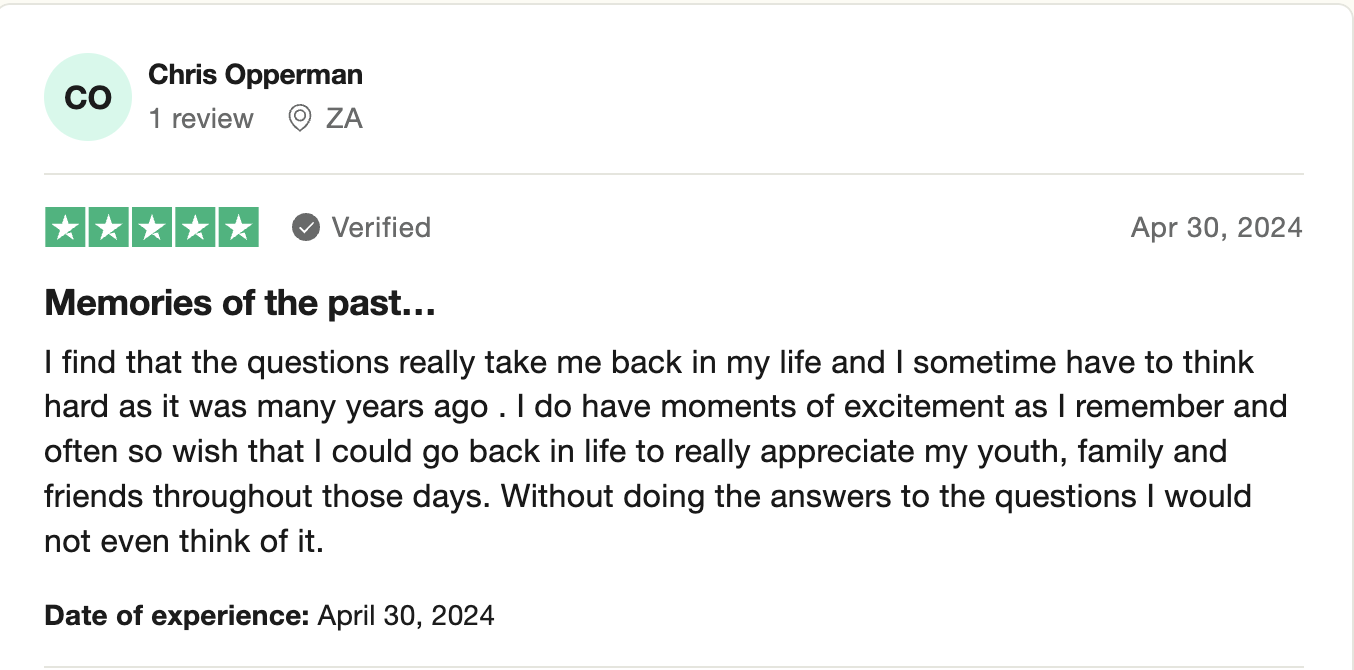
What Customers Say About Remento
Families describe Remento as effortless and emotional, often highlighting how hearing a loved one’s actual voice brings the stories to life. The collaborative process and ease of recording make it especially popular with older storytellers.
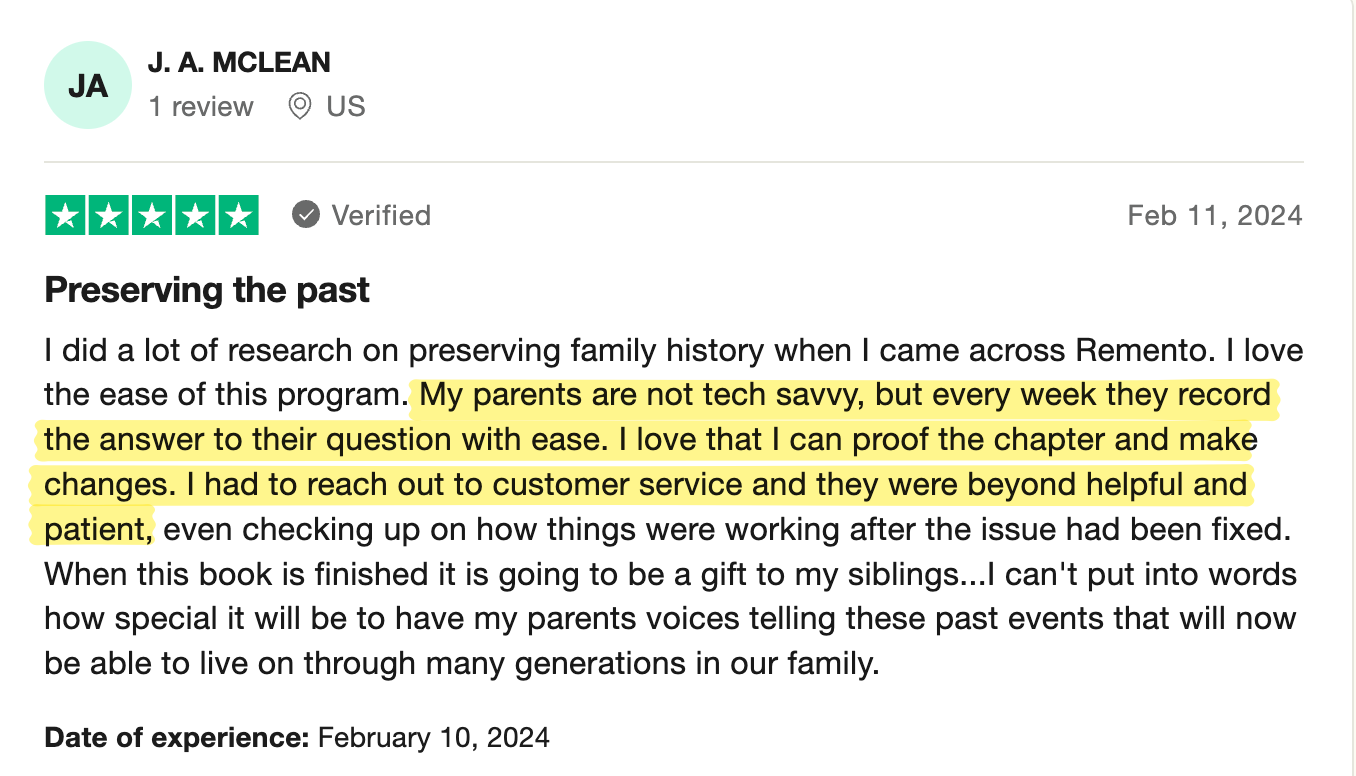

Hear more about what customers say about Remento
The Bottom Line
Each of these storytelling platforms has something meaningful to offer. Storyworth provides structure for those who enjoy writing or dictating word-for-word text. My Life in a Book offers a deep, self-paced writing project. Remento reimagines storytelling entirely, allowing families to capture both the voice and the story, all without typing a word.
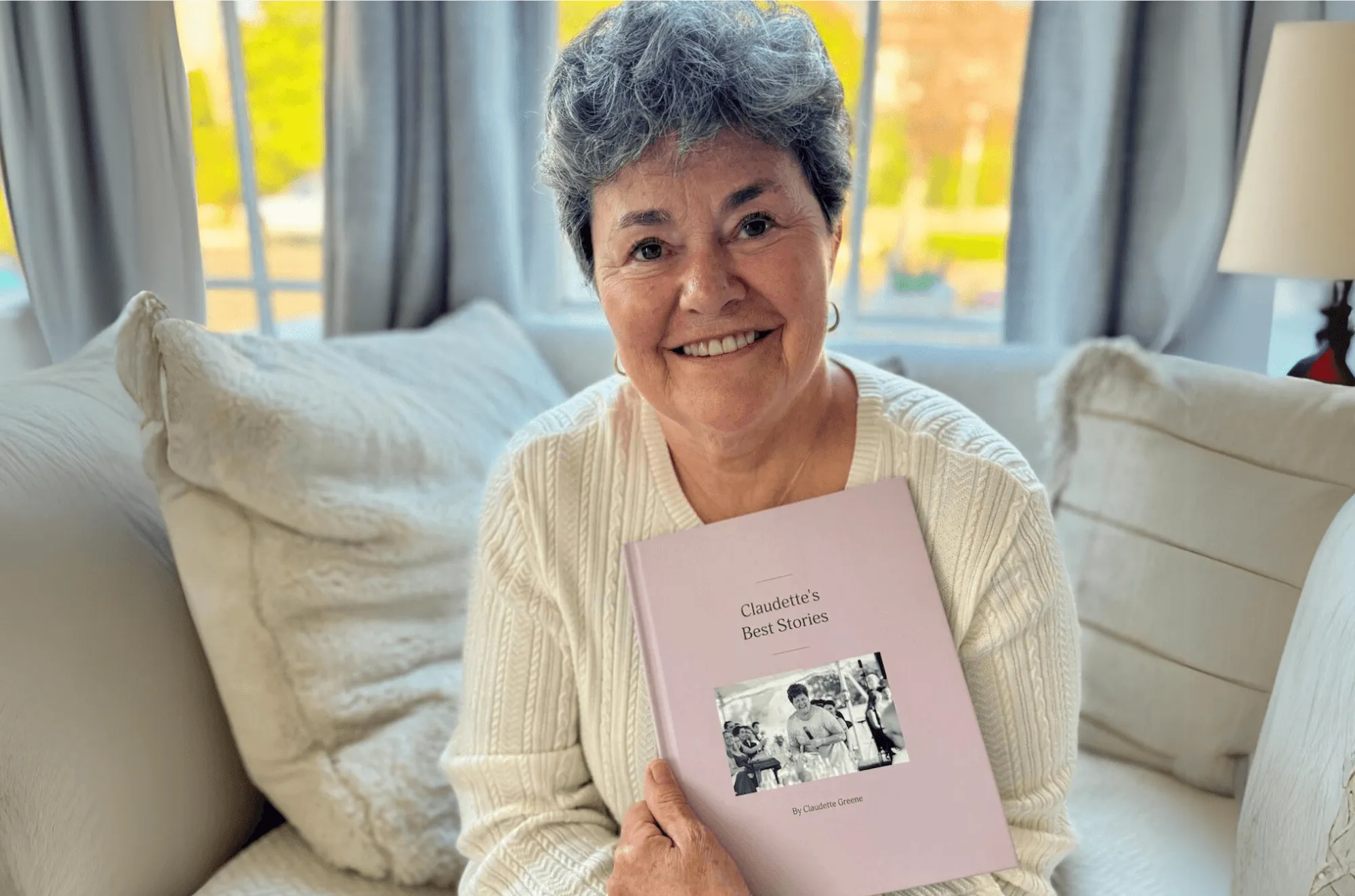
Their stories, forever at your fingertips
Remento’s life story books turn a parent or grandparent’s memories of the past into a keepsake book for the future - no writing required.
Capture priceless family memories today
Join the thousands of families using Remento to preserve family history, all without writing a word.
.avif)
